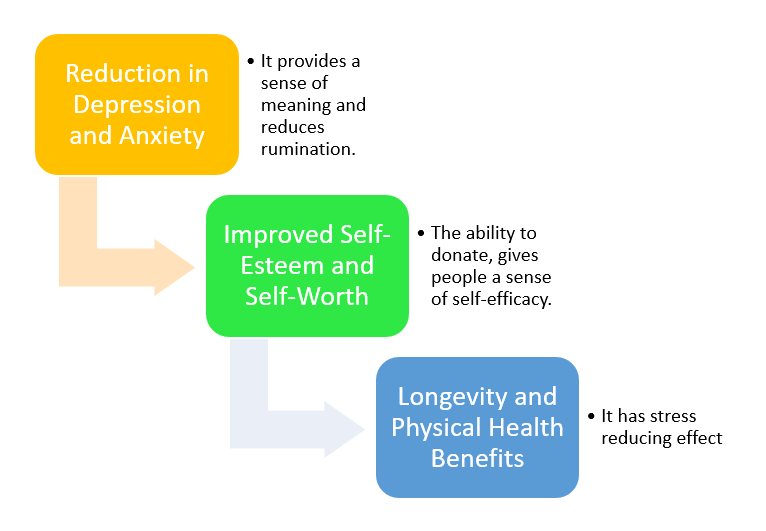Introduction
Donating to charitable causes is often seen as an altruistic act that benefits those in need. However, research in psychology suggests that donating also has profound effects on the donor’s mental and emotional well-being. Acts of giving contribute to improved mood, enhanced life satisfaction, and even better physical health.

Read More- Reducing Bad Habits
The Psychology Behind Donating
Happiness and Giving
Several studies suggest that giving activates areas of the brain associated with pleasure, social connection, and trust. A study conducted by Harbaugh, Mayr, and Burghart (2007) using functional magnetic resonance imaging (fMRI) found that when individuals donate to charity, the brain’s reward system, including the ventral striatum and the mesolimbic pathway, is activated. These areas are also associated with experiencing joy and pleasure, similar to eating delicious food or engaging in enjoyable activities.
Additionally, research by Dunn, Aknin, and Norton (2008) found that spending money on others leads to greater happiness than spending money on oneself. Their study showed that individuals who spent money on others reported higher levels of happiness, regardless of the amount spent. This indicates that the act of giving itself, rather than the financial aspect, plays a significant role in improving psychological well-being.
Empathy and Social Connection
Donations often stem from a deep sense of empathy—the ability to understand and share the feelings of others. Empathy triggers neural circuits in the brain that enhance social bonding and reduce stress (Decety & Lamm, 2006). When we give, we feel a stronger connection with others, which fosters a sense of belonging and community.
Social connection is a fundamental psychological need (Baumeister & Leary, 1995), and charitable acts strengthen our social relationships. Being part of a charitable effort or community reinforces our social identity and contributes to an increased sense of purpose.
Reduced Stress and Increased Well-being
Donating can also reduce stress levels and promote overall well-being. A study by Inagaki and Eisenberger (2016) found that providing social support to others reduces stress-related activity in the brain. Acts of kindness, including charitable giving, have been associated with lower cortisol levels, the hormone responsible for stress.
Furthermore, people who engage in philanthropy often experience a phenomenon known as the “helper’s high,” which refers to the release of endorphins when performing acts of kindness (Luks & Payne, 2001). This chemical reaction in the brain leads to a feeling of warmth and satisfaction, further reinforcing the benefits of giving.
How Donations Affect Mental Health
Three important ways in which donating influences mental health includes-

1. Reduction in Depression and Anxiety
Charitable giving has been linked to lower levels of depression and anxiety. A longitudinal study by Schwartz et al. (2003) found that individuals who engaged in volunteer work and charitable activities reported lower rates of depression and better overall mental health.
The psychological mechanism behind this lies in the shift of focus. When individuals engage in acts of generosity, they tend to concentrate on the needs of others rather than their own problems. This shift in perspective can be particularly beneficial for those struggling with mental health issues, as it provides a sense of meaning and reduces rumination—one of the main cognitive patterns associated with anxiety and depression (Nolen-Hoeksema, 2000).
2. Improved Self-Esteem and Self-Worth
Giving to others can boost self-esteem and enhance one’s sense of self-worth. Research by Weinstein and Ryan (2010) suggests that autonomous giving—when an individual donates out of genuine concern rather than social pressure—leads to increased self-esteem and life satisfaction. The ability to make a positive impact on others strengthens an individual’s sense of personal efficacy and purpose.
3. Longevity and Physical Health Benefits
Interestingly, giving does not just benefit psychological well-being but also contributes to physical health and longevity. A study by Konrath, Fuhrel-Forbis, Lou, and Brown (2012) found that older adults who engaged in volunteer work had lower mortality rates compared to those who did not engage in helping behaviors. This could be due to the stress-reducing effects of giving and the social interaction that often comes with charitable acts.
The Role of Cultural and Societal Factors
The idea of donations differs strakly across cultures, it can be seen as an individualistic or group activity.
Differences in Charitable Behavior Across Cultures
Different cultures have varying attitudes toward charity, influenced by religious beliefs, social norms, and economic factors. Studies have shown that collectivist cultures, such as those found in East Asia, often emphasize group-oriented giving, whereas individualistic cultures, such as those in Western countries, highlight personal choice and self-expression in charitable donations (Markus & Kitayama, 1991).
Religious traditions also play a significant role in shaping attitudes toward giving. Many religious teachings encourage charity as a moral obligation, which further reinforces the psychological benefits of altruism.
For example, in Islam, Zakat (mandatory charity 2.5% – 10 %) and Sadaqah (voluntary charity) are integral components of spiritual practice that promote social cohesion and personal fulfillment.
Charity in Various Religions
Charity is a fundamental practice in many religions, emphasizing the values of compassion, kindness, and social responsibility. While the approaches and traditions surrounding charity differ across faiths, the underlying principle remains the same: to help those in need and contribute to the well-being of society. Many religious traditions view charitable giving not only as a moral duty but also as a means of spiritual growth and purification.
Hinduism: Daan
In Hinduism, charity is known as daan, and it is considered a noble act that purifies the giver and benefits the recipient. The Bhagavad Gita describes three types of daan: sattvic (pure, given selflessly), rajasic (given with expectation of returns), and tamasic (given without proper intent or in an unworthy manner). Hindu scriptures also emphasize the importance of donating with humility, without seeking recognition or rewards. Practices such as anna daan (donation of food) and vidya daan (donation of knowledge) are particularly revered. Charity is often linked to religious festivals, such as Makar Sankranti, when people donate food and clothes to the poor.
Islam: Zakat and Sadaqah
In Islam, charity is a fundamental obligation, with zakat being one of the Five Pillars. Zakat is a mandatory annual contribution (typically 2.5% of one’s savings) to support the poor, orphans, and those in need. It is considered a way to purify wealth and ensure economic balance in society. In addition to zakat, sadaqah is voluntary charity, which can be given in any form, including money, food, or acts of kindness. The Quran frequently emphasizes the importance of helping others, and during Ramadan, Muslims are particularly encouraged to be generous and provide for those who are less fortunate.

Christianity: Tithing and Almsgiving
Christianity places great emphasis on generosity and selfless giving. The practice of tithing, which involves donating a portion (often 10%) of one’s income to the church or charitable causes, is rooted in biblical teachings. Additionally, almsgiving is highly encouraged, especially in times of need. Jesus Christ’s teachings in the Bible highlight charity as an essential virtue, with verses like “It is more blessed to give than to receive” (Acts 20:35). Many Christian denominations organize charitable initiatives, including food drives, shelters, and humanitarian aid programs, demonstrating the importance of supporting the less fortunate.
Buddhism: Dāna
Buddhism promotes the concept of dāna, or selfless giving, as a key practice for cultivating compassion and reducing attachment. Monks and laypeople alike engage in acts of charity, such as offering food to monks or helping those in need. Unlike in some other religions, Buddhist charity is not seen as an obligation but rather as a voluntary act that fosters good karma and spiritual progress. Generosity is one of the Ten Perfections (Paramitas) in Theravāda Buddhism and an essential part of Buddhist ethics.
Judaism: Tzedakah
In Judaism, tzedakah means both charity and righteousness, signifying that helping others is not merely an act of kindness but a moral duty. Jewish tradition encourages people to donate a portion of their earnings, typically 10%, to support the poor, synagogues, and educational institutions. Tzedakah is considered especially meaningful when done anonymously and when it empowers recipients to become self-sufficient. Jewish festivals, such as Yom Kippur and Passover, are often associated with increased charitable giving.
The Impact of Social Influence on Giving
Psychological research suggests that people are more likely to donate when they see others doing the same. A study by Frey and Meier (2004) found that individuals are more likely to contribute to charity when they perceive that their peers are donating as well. This social influence, often referred to as the “norm of reciprocity” (Gouldner, 1960), reinforces prosocial behavior and contributes to the widespread benefits of giving within communities.
How to Cultivate a Habit of Giving
Three easy ways to cultivate the habit of giving-
1. Small Acts of Kindness Matter
Donating does not always have to involve large sums of money. Small acts of kindness, such as helping a neighbor, donating clothes, or contributing a small amount to a charitable cause, can yield the same psychological benefits. The key is consistency in giving rather than the amount donated.
2. Encouraging a Giving Mindset in Children
Teaching children about the value of giving from an early age can instill lifelong charitable behaviors. Research by Warneken and Tomasello (2009) suggests that even toddlers as young as 18 months old exhibit prosocial behaviors and a willingness to help others. Encouraging children to donate a portion of their allowance, volunteer at community events, or participate in charitable activities can help nurture generosity and social responsibility.
3. Workplace and Corporate Giving
Organizations that encourage corporate social responsibility (CSR) not only benefit communities but also enhance employee well-being. A study by Grant et al. (2008) found that employees who engaged in workplace philanthropy experienced greater job satisfaction and motivation. Companies that incorporate charitable initiatives create a positive work environment that fosters social connection and purpose among employees.
Conclusion
Donating to charitable causes is not just an act of generosity—it has profound psychological benefits for the donor. From activating the brain’s reward system and reducing stress to enhancing self-esteem and promoting longevity, giving enriches both mental and physical well-being. Furthermore, cultural, societal, and organizational factors play a role in shaping giving behaviors, making philanthropy a powerful tool for personal growth and social cohesion. Encouraging a habit of giving, whether through small acts of kindness or organized philanthropy, can lead to a more fulfilling and happier life for individuals and communities alike.
References
Baumeister, R. F., & Leary, M. R. (1995). The need to belong: Desire for interpersonal attachments as a fundamental human motivation. Psychological Bulletin, 117(3), 497-529.
Decety, J., & Lamm, C. (2006). Human empathy through the lens of social neuroscience. Scientific World Journal, 6, 1146-1163.
Dunn, E. W., Aknin, L. B., & Norton, M. I. (2008). Spending money on others promotes happiness. Science, 319(5870), 1687-1688.
Harbaugh, W. T., Mayr, U., & Burghart, D. R. (2007). Neural responses to taxation and voluntary giving reveal motives for charitable donations. Science, 316(5831), 1622-1625.
Nolen-Hoeksema, S. (2000). The role of rumination in depressive disorders and mixed anxiety/depressive symptoms. Journal of Abnormal Psychology, 109(3), 504-511.
Subscribe to PsychUniverse
Get the latest updates and insights.
Join 3,045 other subscribers!
Niwlikar, B. A. (2025, February 5). Psychology of Donating and 3 Reasons Why You Should Donate. PsychUniverse. https://psychuniverse.com/donating/




Pingback: The Joy of Gifting and 5 Interesting Gifting Ideas - PsychUniverse